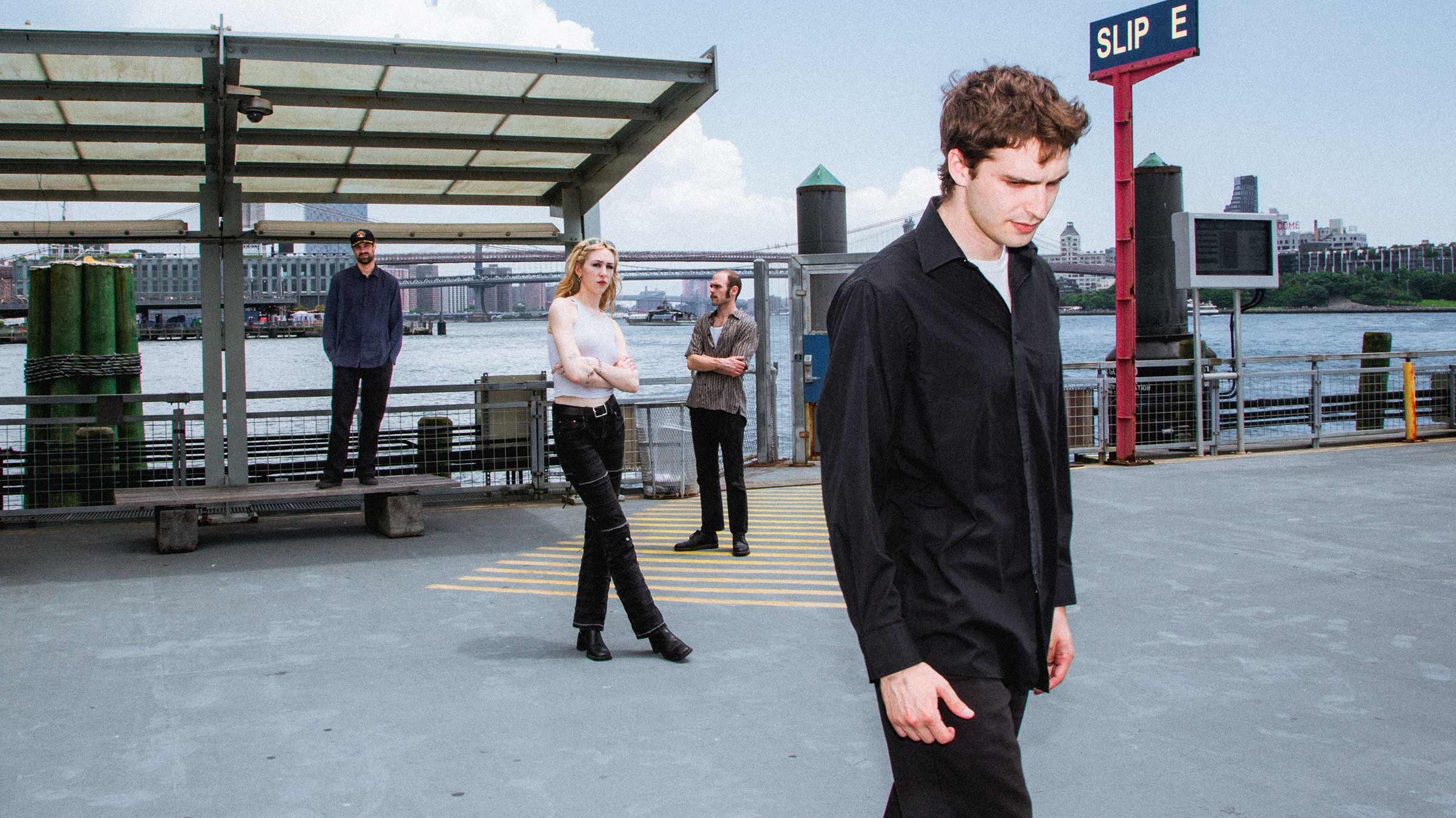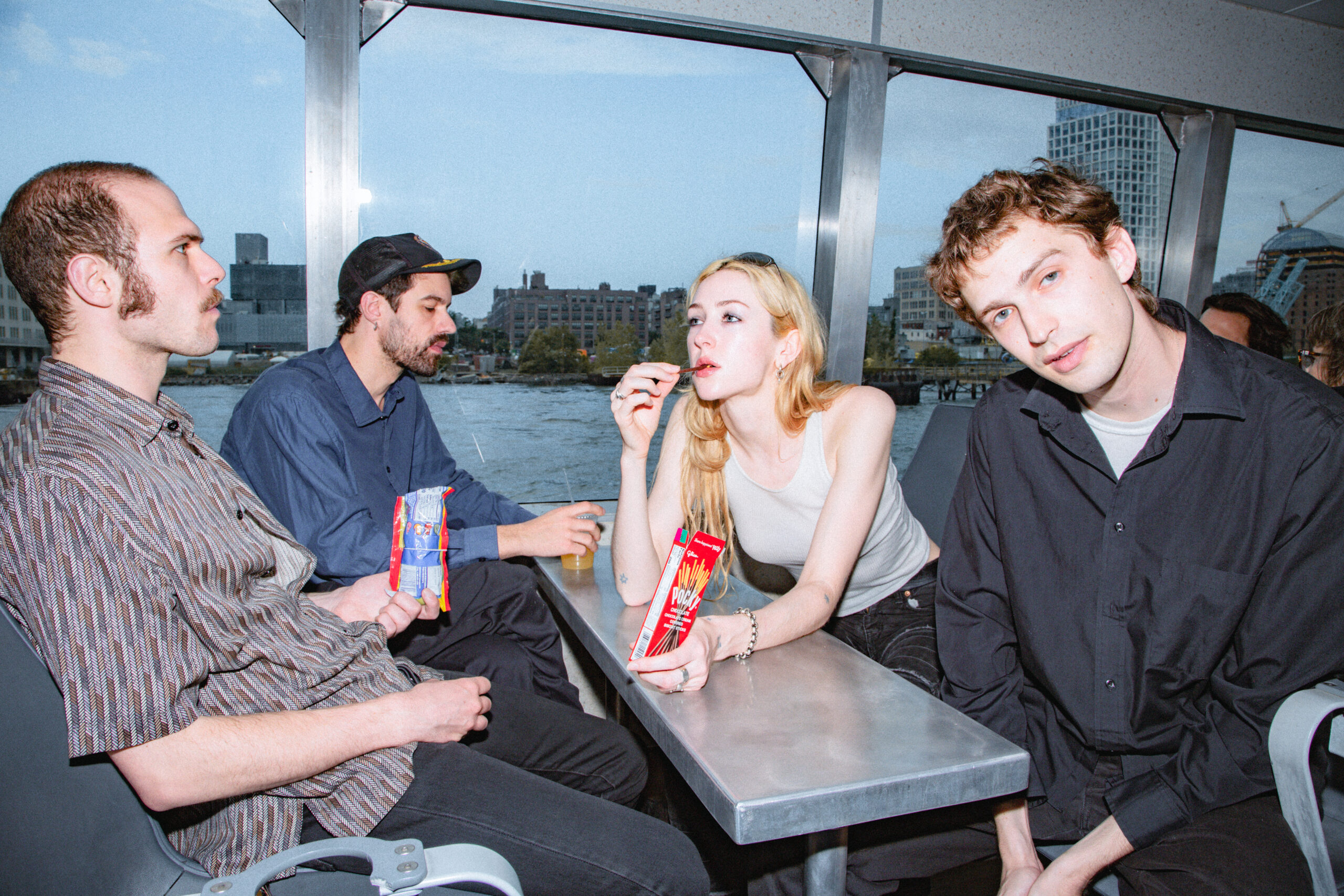The band speaks on their latest album, ‘Pure Music,’ the spirituality of performance, and the age-old tradition of art-making
I used to tell people that the closest I ever get to having a religious experience is when I see music. You know—that feeling of togetherness and abandon, of collective surrender as the beat carries you away from your body, dispersing your soul into the sound. While it’s a corny, unoriginal statement, and I’ve long stopped saying it, the sentiment remains true as ever—and the preciousness and universality of those transcendent moments have only been magnified by their absence during the quarantine.
This feeling of reaching euphoria through art was on the minds of the members of Strange Ranger as they created their fourth album, Pure Music. Infusing their signature indie guitar rock with elements of dance music they fostered on their 2021 mixtape No Light in Heaven, Isaac Eiger, Fiona Woodman, Fred Nixon, and Nathan Tucker have cultivated a sound that both captures and creates that sublimity.
While the songs cycle and mix through genres—usually on the same track—the tone of the lyrics maintain consistency, underpinned by a current of contemplative, at times existential, yearning. Midway through the album, on “Blue Shade,” Eiger and Woodman’s harmonies lock in a way that calls to mind Low’s Alan Sparhawk and the late Mimi Parker, as they sing, “I’ve been listening / To your heartbeat through my walls / For quite some time / I’ve been singing the praises of a bluer shade / I am shining light on 90 interstate / Kicking up dust on the demons in my lane.” After the vocals cut out, the song accelerates into a thumping trance section, its expansive melancholy released in an electronic catharsis. Thus is the ebb and flow of the album—its intimate lyrical moments anchoring it through the sonic swell.
Document caught Strange Ranger on the eve of Pure Music’s release in late July to discuss formative moments of transcendence, their favorite films, and how it’s crazy that humans make art at all.
Maraya Fisher: Your mixtape, No Light in Heaven, definitely seemed like a period of experimentation with different genres and production techniques that sort of solidified on this new album. I was wondering if you could tell me a little more about that metamorphosis and what fueled that departure from your original sound on Remembering the Rockets.
Isaac Eiger: It didn’t feel like we made a decision, like, Okay, now we’re doing this. The stuff you like changes, you know? If what you like changes, but you keep making the same thing, you’re going to hate what you’re making. I think we got really into a lot of dance music and ambient music in the last several years, and the mixtape was sort of our first opportunity to integrate that into what we were doing. We also got a lot better at production.
Nathan Tucker: I think there’s a bit of a material thing at play here, where—at least speaking for myself—I got some pandemic unemployment money and balled out on gear a little bit, and I just wanted to use it, because it’s fun.
Fred Nixon: Had a little bit more time on our hands.
Nathan: Yes, that too.
Maraya: Do you ever find there’s pressure from your long-time listeners to stay consistent? And how do you respond to that?
Isaac: You can’t really worry about it. You just have to do what you want to do. If somebody likes your art, then hopefully they keep liking it. But if they don’t, that’s fine, too. I don’t like everything that a band I like does, or a filmmaker I like makes, but somebody probably does.
Maraya: Isaac, you’ve spoken about looking to music to find spiritual meaning. I was wondering if you could expand on that idea, and how this album plays into that.
Isaac: Even if you’re not religious, everybody encounters this sort of sublime feeling, this ecstasy of touching something else. Some people do that through meditation or drugs or being in nature. I think the reason people like art is because it can do that. I can think of these really crazy experiences I’ve had, listening to a song or seeing a movie or reading a book, and feeling like I was breaking through to something that doesn’t really have anything to do with the rest of my life. I think we’ve always tried to do that. Especially getting into dance music. On this album, I was thinking about the spiritualism of music and life, and hopefully, that is apparent when you listen to it. It’s not going to hit for everybody, but hopefully, it will for some people.
Maraya: Can each of you describe a time you had that kind of experience?
Fred: The thing that always comes to mind is my earlier days of playing music—particularly of trying to be in a rock band and stuff. Me and Isaac and our first drummer back in high school would just jam on ‘Dramamine’ by Modest Mouse for, like, an hour or something. And as a teenager, that was a cathartic release that really opened my eyes to how amazing making music feels.
Nathan: I grew up, in high school and college, being really into jazz and playing saxophone. Where I lived in California, in Monterey, is close to Santa Cruz, and there’s this really good jazz club there called the Kuumbwa. I have a particularly vivid memory of seeing the jazz trumpet player Roy Hargrove there, who died recently. He was amazing; he looked basically asleep for, like, whole sections of the show. And then, when it was his turn to solo, he would just go somewhere else in a really palpable way. I had been, at the time, getting really into improvisation—trying to do that same thing of being fluent enough in musical material that you could just turn your brain off and go somewhere else with it. Seeing that when I was 16 was really powerful for me.
Fiona Woodman: Music was extremely huge for my mom and stepdad, for my family. I got my taste from them. Elliott Smith was always playing in the house, all the time, since my earliest memories. In Portland, it’s kind of an inherent condition to have depression. [Laughs] And I feel like that music was a piece of life that made me experience happiness, you know? And that’s always been true in my life; it’s one thing that I can find joy in, as corny as that sounds.
“Music was a piece of life that made me experience happiness, you know? And that’s always been true in my life; it’s one thing that I can find joy in.”
Maraya: No, that’s real.
Isaac: Several years ago, I saw Slacker, which is this Richard Linklater movie about people sort of just hanging out in Austin, Texas. I feel like I get into these ruts with art where nothing is hitting and everything feels the same, and I forget why I care about it. I remember seeing that movie—and nothing crazy happens, but it gives you this sense of the insane webs of everyone’s lives, and how one life collides into another. Something about the movie just rattled me, and it felt like I was reencountering why I love all this stuff so much. It exploded my brain and made me feel full of potential.
When something hits me like that, I always have this sort of secondary experience where, not only am I destroyed by the thing that I’m listening to or watching, but I’m also destroyed by the fact that this can happen. That something someone made can shake you out of yourself in such an extreme way. It’s not some crazy privilege to do, necessarily, because people have been doing this for thousands of years. It’s just insane to me that making art is a way that people spend their time, and it’s something that is one of the core values of human beings on planet Earth—just these stupid, weird animals. So when I watched Slacker, I felt confronted with all of this at the same time. I haven’t watched the movie again, because I feel like it’s not going to hit in the same way.
Nathan: Yeah, it probably won’t. [Laughs]
Isaac: All we really need to do is eat and have sex, but there’s this other thing, too. And it feels like it’s from some other plane.
Maraya: I feel like euphoric is a word that’s used a lot in reference to the new album. Was there a time when you were making the album when you collectively felt that way, or experienced a breakthrough moment?
Nathan: I think there were a ton of breakthrough moments.
Fiona: And they were all at, like, three o’clock in the morning.
Nathan: I feel like the whole experience of making the album was just hours of drudgery and nothing working, punctuated by moments of total euphoria.
Isaac: I remember the last song, when the dance section came together, just jumping around and blasting it in the house.
Nathan: I have a video of that on my phone.
Isaac: Just crazed, and feeling like I was touching God or something. The other thing is that we were listening to tons of music, too. I remember we were listening to Lanark Artefax, this dance guy that I just love.
Nathan: I was just listening to that today.
Isaac: That’s how he was making us feel. We were reaching for the same thing, and—at least for us—it was hitting.
Maraya: Do you relive that a little bit when you play the music live?
Fiona: We just started playing the last song on the record live—for the first time at the 4 Irving show in New York a couple weeks ago. I definitely felt super euphoric, because the end has this long dance sequence. Isaac also gets to jump around and freak out during that part. [Laughs] And that’s really fun.
Fred: It’s going to be better when the set is tighter, too. I feel like I have too much to think about right now, because there are so many moving parts in our music. I can’t let myself get too into it, or I’m going to forget to change the synth pad or whatever—miss an entrance, or fuck something up. But, yes, in theory. That does come, and it will.
Nathan: At its best, playing live always has a bit of that for me. I’m always at least struck by the sort of thing Isaac is talking about, like, Damn, it’s crazy this works.
Fred: There’s a really nice and powerful moment for me in the set now, with ‘She’s on Fire.’ When the second chorus hits, I’m not doing anything for the first half of it, so I can just look out and see the audience knowing the words and shouting along.
Maraya: I’ve always really liked your visual aesthetic, as a band. I was wondering what films or visual art have played into that.
Isaac: Recently, Lost Highway has been a big touchpoint for me. Just the strangeness of it, and how it superimposes this feeling of ecstasy with disgust and queasiness. The last scene is one of my favorite scenes in a movie.
Fiona: Not to keep referencing the pandemic, but we were watching a lot of films during that period, and that is also when the album was being conceptualized, mostly. But a lot of those songs, Isaac, you wrote years before that, right?
Isaac: Yeah.
Fiona: But we were watching some Lynch films and Heat.
“It’s just insane to me that making art is a way that people spend their time, and it’s something that is one of the core values of human beings on planet Earth—just these stupid, weird animals.”
Nathan: Heat for sure. Heat is inescapable, I think.
Fiona: [Laughs] Visually, definitely a big inspiration.
Fred: There’s this movie, The Keep. It’s this weird Michael Mann exploration into the supernatural, and it’s set during World War II. It’s a really bizarre intermingling of Michael Mann vibes and demons from hell. It’s kind of not very good, because I think the effects director died before the movie was finished or something, and the studio just took over and butchered it, and Michael Mann hates it. But it’s a very interesting vibe crossover.
Isaac: I think Terrence Malick movies are big for us, too. Particularly the first three: Badlands, Days of Heaven, The Thin Red Line. Talk about spiritualism in movies. It’s definitely a huge part of his stuff.
Nathan: Speaking for myself, Light Sleeper by Paul Schrader was a great looking-cool-at-nighttime movie.
Nathan: I just watched this movie that I know Isaac likes a lot: Strange Days.
Isaac: Dude, fuck yeah.
Nathan: I watched that like a week ago, and I was like, Of course Isaac loves this. It’s so good.
Maraya: Is there anything else you want to say about the album?
Isaac: Just don’t say we’re a Dimes Square indie sleaze band.
Strange Ranger’s New York album release show is this Friday, August 4, at Drom.











